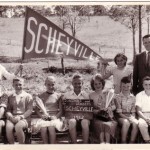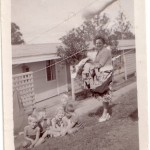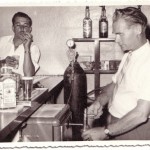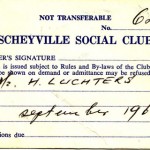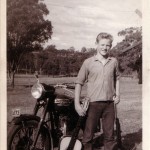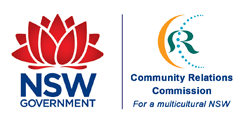Migrant accommodation: Scheyville (Sydney)
My name is Johan Luchters.
I live in Holland; married to Stans; we have three children and five grandchildren. I am working as a primary-healthcare psychologist and I have many interests. In the early sixties I lived in Scheyville for a couple of years; a period of many fine memories.
Going back to Scheyville
In January and February 2009 Stans and I visited Australia. I longed for this visit for more than forty years, because of my memories of Australia and particularly the place we lived: the Migrant Accommodation Centre Scheyville.
In the early morning of Friday the 23rd of January 2009 Stans and I took the train from Sydney to Mulgrave. Back in 1962 and 1963 I often took this train in the morning the other way, from Windsor to Sydney. But I will come to that a little later.
Before Stans and I left for Australia I contacted Mr. Jonathan Sanders, the Area Manager of the Cumberland North Area. He invited us to visit Scheyville. On arrival at Mulgrave Station one of the rangers, Mr. Col Davidson came there and drove us to Scheyville.
It was very exciting and even emotional, driving past McGrath’s Hill, then the road to Pitt Town and finally Scheyville; trying to find the house of Mr. Japp the headmaster of the school; and having the first sight of Scheyville’s main buildings. When we got out of the car I was walking on the same road and being in the same place where I was, as a very happy young boy, 47 years before. Of course a lot has disappeared and a lot changed, but anyway it felt like being in a very familiar surrounding, like home, again. So you see these feelings do not disappear. Even when I walked through Scheyville, seeing the ruins, but also the buildings that are still there in fairly good condition, more memories of seemingly forgotten experiences came up. It was wonderful being there again.
A special word of thanks we have for the rangers who have their office in the main building of Scheyville now. They gave us all the support we wanted: thanks to Mr. Jonathan Sanders, Mr. Col Davidson, Mrs. Helen and Miss Jazz. In the office of the rangers nowadays there is a small exposition with photos and photo-books and a lot of history. When going through the photos I recognized a lot of people. I saw some ladies and gentlemen who worked in the mass with my mother, I saw Mrs. Mueller and her youngest daughter, and I even saw my mother sitting at a gathering about the kindergarten where my youngest brother went. The photos I brought with me were copied and are now in the exposition as well.
Preparations for migration
In 1959 my parents decided to migrate to Australia. We were a family with eight children, me being the oldest, 13 years old then, my six sisters and my younger brother of five. My dad was triggered by the adventure of going to this exiting country. We heard a lot of good things about Australia, i.e. about the wonderful climate and nature, and about the good opportunities to get good jobs and live in a free world. My mom took it for granted, and settled to the idea. Until his death in 1992, whenever I met my dad, he and I talked about our adventurous experiences in Australia. Of course we romanticized a lot, but still it was sort of a memory of having been in paradise, which gave both of us good feelings. Like most people we remembered mostly the good things, and maybe forgot the hard times, although even up to today I personally don’t remember any; but for my parents there were also very hard times during our stay in Scheyville.
While preparing our departure to Australia my parents talked to migration agents and to some other people who had some experience with Australia. On evenings they went to school to learn English. So one day we said goodbye to relatives and friends and we headed for Sydney.
We were all just ordinary Dutch people, although we could afford going on holidays, traveling by bike to a camping and living in a holiday-hut for a week. We had never been in a plane; even most of us had never even seen a plane, except maybe in photos. So, all of our experiences were very impressive. Flying across the world, landing and staying on the airfields of cities like Bangkok, Beirut and Manila. Getting chewing-gum, every time we were going to land. Our last stop before Sydney was Biak, New Guinea. I remember it was early in the evening landing at the airport. There were drums which were set afire; these were beacons for the pilots to land on the right air-strip. Of course at that time I did not know that my future wife was living just a few miles further on in Manokwari.
The next day we set off for Sydney. We flew across Australia by daytime. I think we flew a lot lower than nowadays, so we could see the country from above. There were great plains and here and there a square with a building in the middle and a round drum beside the houses. I even think that we saw the herds of cows or sheep. Just before arrival in Sydney we could see the shade of the plane on the ground. We saw the coastline, the beaches, and then the palm trees, which we thought were only in paradise. So my feeling was that I really arrived in paradise. When we got out of the plane we felt the warmth. It was late in the afternoon. There was a bus waiting for us and we headed for Scheyville. We had no idea what was waiting for us.
We stayed for only three years in Australia, all this time in Scheyville.
Life in Scheyville in the early sixties
In the first days the impressions were overwhelming for a thirteen year old boy. We were so happy being in the sun, walking on flip-flops, in shorts. Eating in the big mess; eating mutton for the first time and tasting water-melon. Seeing the beautiful birds, especially the rosella; now and then a lizard or a snake.
But too bad: we got sunburned and had to go to the hospital which was beside the Catholic Church. The blisters on our shoulders were sometimes about 10 centimeters big. When we had a shower the blisters filled up with water and broke. It hurt, but we didn’t care much. We just went to the hospital where the sister would put a lot of greasy, white stuff on our backs, nose and ears and that felt good enough again.
School
We went to the migrant school in the camp. I was first in the class of a teacher who was a migrant himself from an East-European country. He was a kind, older man. I do not remember his name. Then I went to Mr. Swinton’s class. At the end of the term I was the spelling champion and got a booklet, which I still have. I remember there was a girl in our class who was the best in English language. This was Miss Gene Murphy.
At the beginning of the school-day we first lined up and Mr. Cole, another teacher, set up the tape-recorder with music and we marched to our classrooms. Mr. Japp the headmaster was on the veranda with the other teachers. During the break at ten, we all got a cold little bottle of milk. Now and then we had folk dancing lessons on the playground. I remember the cane hanging under the school-board. In Scheyville I never got the cane, but later at Richmond High School I did several times, because I took the train the other direction to Sydney instead of going to Richmond. Missing school was not too bad and walking in the city and taking the Manly Ferry was exceptional fun and exiting for a boy from a little village in the East of Holland. From the Manly Ferry I saw the building of the New Opera House.
Because I was a pretty good student I had a wonderful time at the camp school. This was not so for my little brother. He hated going to Kindergarten; felt like being put in a cage while being in paradise, I think.
I was on the rugby team. Our best player was Kazimir. Mr. Cole was our coach. From my classmates I remember also the brothers Proft from Germany: Eduard, Axel and Manfred. Eduard was one of my close friends in that time. There also were Helen and Barbara, whom I also met at the church, Jack Salmi from Finland, Heiny Buchholz and Evert Driessen from Holland, and Timo Keskinumi, also from Finland I think. My best friend in the years I lived in Scheyville was Marco Djuric, from Yugoslavia. I remember his parents, his older brother Ljubomir and younger brother. They were very nice people. One of the things Marco and I did together was making comic-strips. Marco is excellent at drawing comic-figures very fast. My job was to produce some text and conversation that matched with the drawings. From Marco I also learned the Yugoslavian alphabet, which in part I still can rehearse.
Of course my girlfriend Ulrike Müller was the most beautiful girl in the camp. I was a lucky boy to be with her. Later when I was back in Holland she wrote me a letter saying that I should do some effort trying to get Marco off her back. I think he started chasing her as soon as I was gone. I still can laugh about this and I still have this letter Ulrike sent me, so there is proof of this.
At night when there were no children on the playground behind the school there used to be lots of big rats. They lived probably under the school. We soon got used to this and didn’t care about this.
In my second year in Australia I went to Richmond High School. Every morning we would travel by bus to Windsor station and then by train to Richmond. From the Scheyville kitchen, where my mom worked, we got a lunch package. I ordered a sandwich with banana slices and one with beans in tomato-sauce. By twelve o’clock when it was time for lunch the sandwiches in the paper bag were like Irish stew. But I liked it very much anyway.
At the high school I was put in class 2F. I think this was because then you could get higher up the next year if you seemed to be a good student, or you could go to a more practical class if your cognitive ambitions were less. They didn’t know me, so they gave me a chance. I liked the school a lot, although I liked traveling to Sydney now and then, instead of traveling to Richmond, much more. A couple of times I got the cane for not coming to school. Then I had to report to Mr. Beatty’s office. He was the headmaster then, although he would not give the cane-hits himself, there was another teacher doing this work. I don’t remember him; maybe a Freudian fade-out of memory. I did very well at High School. We did Chemistry as well as Australian History and of course English. I was pretty good at English, sometimes even better than some of the Australians.
Our teacher was a lady whom I liked a lot; her lessons were joyful, that is probably why I got so motivated. At the end of the school-year, it was 1962, we got the yearly exams. I didn’t mind as I would likely get through easily. When we did English I was the first one of all finished. I rushed proudly forward to bring my exam to the teacher, and could leave the room. I got compliments from the other kids in my class. A couple of days later I was called to my teacher English and she asked me why I only finished half the exam: were you feeling ill or something, she asked me. What seemed to be the case? I forgot to look at the backside of the exam and only worked out half of it all. So next school year I would still be in 3F and not in 3B or C.
There was a lot of time for sports on High School. We would play rugby and sometimes also soccer, because there were migrant-kids who wanted to play it. Our teacher was Mr. Pane, I remember. Somewhere in the next school-year I stopped going to school because my parents had decided we would go back to Holland.
Time after school
Besides going to school there were many other things that I did.
I was an altar-boy in the Catholic Church. Father Victor Doyle was the priest. He taught me a lot of good things and he took us in his Holden to many places outside the camp. It is for a great part to him that I had so many wonderful experiences in Australia. He took us, the altar-boys, to the Sydney beaches, to the Blue Mountains, to Port Kembla, where he came from and where some of his relatives lived. Next to the church was a little house where the sisters lived. One of them was Sister Benedict. The sisters organized creative workshops in the Nissan hut near the main building. I saw that this hut still exists now, although the church and the other buildings around the church are gone. At the gatherings with the sisters we made lampshades and cane-baskets in all sizes. My mom still has one of them.
My parents both had a job. My mom worked in the camp-kitchen. Besides working for many hours in the kitchen, there were eight kids who had to be taken care of, so she spent a lot of time in the washing-rooms as well.
My dad worked in Sydney in the first year we were in Australia. During the week he stayed in Villawood. I remember visiting him once in Villawood. I was very impressed by the surroundings, so I thought this is the place I would like to be if we had to leave Scheyville for some reason. Being nearer to the city, there were more things going on. In the second year of our stay in Australia my dad worked in Richmond on the airfield as an electrician. He traveled by motorbike. After his Triumph he bought a Norton 650 cc. At that time a very heavy bike and he was very proud about this and wrote it to his friends in Holland. In earlier years he drove a 250 cc, which was normal in Holland. If you compare the Norton with the motorbikes nowadays, it is very strange to imagine that we found this bike so extremely big and heavy.
In the last period of our stay my dad worked in the camp. He was the electrician, the movie-operator and the barman of the staff and the social club. We kids loved going to the movies, for us it was even free because our dad was the operator, so we went there as often as possible. In the social club there were many parties I know, and there was a lot of drinking going on. Somehow I think this smoothened the hard times. There have been many photos left from the staff-parties.
My parents made many friends in the camp, working in the kitchen and as a staff-member.
Besides working in the camp my parents worked for a farmer in Maraylia. It was Mr. Lesley Skidmore and his son Kevin. After being back in Holland my father often talked about the Skidmore’s. He liked these people very much. We, the older kids had now and then to go with our parents working on the fields. There were big fields with gherkin; there were oranges and lemons to pick. We all earned some shillings by selling oranges, we got from the Skidmore’s, in the camp. I think we sold them for a couple of shillings per bucket.
When I was free I mostly went with friends into the bush, looking for animals, especially birds and visiting our tree-hut. I got an air-rifle from my dad, which I took along. I really shot some animals, which I now very much regret, but at that time it was part of the adventurous life I lived. I even tamed a magpie, which was on my shoulder walking through the bush. I remember my mom being very angry, every time my magpie went poo on my t-shirt. The stains would not go out of the shirt. At that time there were a lot of birds we called soldier birds. More than 30 years later I tried to look up these birds in bird-guides but cannot find them. Now that I have been back in Australia I think they are the ‘noisy miner’. I can nowhere find the name ‘soldier bird’. There was one friend of ours in the camp who played guitar. I liked that very much and I wanted to learn to play myself. So my dad bought me a guitar, and I started to take lessons. It lasted only a short time, because we left Scheyville soon after I started the lessons. I find it very strange that, when back in Holland, I sort of forgot the guitar, never thought of playing or learning to play again.
When I was about 58 I again started to take lessons and up to now I do play on the guitar, not as a professional, so don’t invite me to play on your parties. I still have this old guitar from Australia and keep it as a memory of the good and musical times. The same is with the music from the early sixties, especially the Australian hits from Johnny O’Keefe and others. Nowadays you can buy these again, which is nice.
The last couple of months in Scheyville I stopped school and went for a job to a farmer in Maraylia. He was an immigrant from White-Russia. He had a small farm, together with his wife. There were very young calves which had to be fed and we went with an old truck to farms and studs in the region to get dung from horses, cows and chicken. The dung we brought to farmers who grew mushrooms. It was hard work, especially lifting the horse dung with the straw over a fence we had put on the back of the truck. Every time we lifted a heavy heap we farted and laughed a lot about that.
During my stay in Scheyville I also traveled with friends of my parents to Melbourne, staying also in Canberra for a couple of days and in the Snowy Mountains. I also went to Surfer’s Paradise. When I visited Australia with Stans, I had planned to go to Surfer’s Paradise also. But being in Port Macquarie I met a kind Australian man who said to me: go anywhere but not to Surfer’s Paradise. You won’t find a camping place and you will find a lot of pickpocketing. This trip we did not go to Surfer’s Paradise, but next time we are in Australia we will visit this ‘paradise’.
Leaving Australia
After about a three years stay in Australia we went back to Holland. My mom missed her parents very much, and because my dad could get his former job back, my parents decided to go back. If I had the choice then, I would not have gone back.
Back in Holland I got the idea to work on a plan to go back to Australia. I would go to the nautical college and try to become a seaman and travel to Australia. I could not just start this school because I did not have the right schooling and I was too young to just go and work as a sailor. So I went to one of my uncles, who was the head of a secondary school, teaching German and English language, and he proposed I would work with him the rest of the school-year, going from class to class and speaking English, so the pupils could learn a lot from the conversations we had. In this period I talked a lot about Australia with my uncle. In exchange my uncle gave me a report which said my education-level was sufficient for entering the nautical college.
I started this education, but before finishing it I went to work as a ship-engineer. Instead of going to Australia, I sailed the Mediterranean Sea and the African coast. Than I met Stans and we settled down. I joined the Royal Dutch Air force and was a sergeant-instructor for seven years. We had our children and lived as a happy family. In this period I also finished college-education and went to university. For a long time I did not think of Australia any more.
Looking back now
As years went by my memories of the experiences in Australia sort of slipped away and were only in the background. But then there was the internet and the world opened-up. The most important development concerning my memories of Australia was the internet. I tried to look-up the different places we had been in Australia. I found a lot of interesting information about Scheyville and I even tried to trace old friends or other people’s names. So one day I found out that father Doyle, the priest I worked with as an altar-boy in Scheyville, had received the Australian Medal of Honour for his social work. And I found out where he lived at that moment. So I wrote him a letter, it was December 7th 2004, congratulating him and telling him of the fine memories I had of the time being with him. I even sent him an old photograph.
A few weeks later I got a letter from Mr. Leo Doyle, father Doyle’s younger brother, telling me father Doyle had passed away on 12th October 2004, two months before I wrote the letter. I felt very sad that I did not trace him earlier.
In this period the internet made Google-earth possible and it was again very interesting to look at Scheyville and surroundings from above, and see how things were changed. All this brought back the memories and the longing to go back and visit Australia.
Now that I have been back and visited the camp-site and other places I was before, like Mitchel Park, Cattai Creek, Pitt Town, Windsor, Richmond, Blacktown and Sydney, I also see the differences between the early sixties and nowadays. Besides of course the changes at Scheyville, there are the changes in the surroundings. Nowadays you see horses everywhere, only a few cows and sheep; big lots with beautiful houses on them; less bush; a very few orchards with oranges and lemon. And then the possible change of temperature. In the early sixties I think in summer it could be 35 degrees centigrade, but visiting Scheyville in January 2009 the temperature went up to 45 degrees.
The possible impact of my experiences in Australia on my life
This last chapter is about the thoughts I have about the influence of my experiences in Australia on the choices I made in my life. Of course there is no proof of this. It is only my guessing how it could be.
I presume my special interest in birds developed in the bush around Scheyville and has never left me. I like to do trecking in the Alps with a rucksack and a tent, and even went to Nepal in the Himalayas and climbed the Kilimanjaro in Africa. When I am wandering in the mountains I always think of the days I took my tent to Mitchel Park, camping there with the animals around me, making a campfire in the open; having my air-rifle within hands reach. Even my study at the university could have come from the fact that father Doyle showed interest and trust in my cognitive abilities. He took me to some Catholic secondary schools, visiting his friends and colleagues, and he made clear I also had possibilities to study. And of course there is the guitar. The fact that my wife, our kids and I for years went to the Provence in France on holidays is maybe because I find this area much like the part of New South Wales I lived for a couple of years.
Nowadays in Holland on the political level there is a lot of discussion about immigration and integration of various cultures in the Dutch society. I often think of the way we lived in Scheyville with many nationalities and without problems on that issue. How come? I think it made life more interesting instead of problematic. But there is of course a great difference.
I could easily write a book about my time in Scheyville and about all the memories and the theories about what caused what, because as I write more and more, more things come up. This will never stop and never be complete. But one thing is very important; we will visit Australia and Scheyville again, sometime.
Johan Luchters
Ven-Zelderheide, The Netherlands, Oktober 2009

